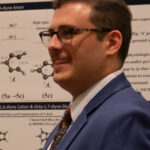
Accelerating Curricular Transformation in the Computational Molecular Sciences Faculty Fellowship
The Molecular Sciences Software Institute (MolSSI) is pleased to announce the launch of a new education and faculty development program: Accelerating Curricular Transformation in the Computational Molecular Sciences (ACT-CMS). The goal of ACT-CMS is to transform science curricula by accelerating the integration of programming and computation into existing molecular science courses through faculty training and the development of open and reusable curricular modules.
ACT-CMS will achieve this goal by providing faculty with the training and resources needed to integrate programming and computation into their existing courses. ACT-CMS is generously funded by the National Science Foundation Training-based Workforce Development for Advanced Cyberinfrastructure program (OAC 2321044,OAC 2321045).
For more information about the ACT-CMS fellowship program, please visit the ACT-CMS website.
Meet our faculty fellows!
Congratulations to our MolSSI Faculty Fellows! These molecular science educators will collaborate with MolSSI to integrate programming, data competency, and computing into their curriculum. ACT-CMS Fellows convene with us each year for a week-long Curriculum Development Bootcamp.
2025-2027 Faculty Fellows

William Ames
Juniata College
Modeling the kinetics of reactions in Python with QM calculated transition state energies.

Keith Fraser
Rensselaer Polytechnic Institute
Structural Bioinformatics

Robin Grotjahn
(Santa Clara University-Award Fellow)
Santa Clara University
High Performance Computing Applications in a General Chemistry Laboratory

Heidi Hendrickson
Lafayette College
Modules for quantum information science in physical chemistry

Linlin Jensen
The Pennsylvania State University
Data Analysis and Visualization with AI-enhanced Programming in General Chemistry Courses

Prajay Patel
University of Dallas
Transitioning from Excel to Python for Inquiry-Based Data Analysis in Physical Chemistry Labs

Craig Smith
Washington University in St. Louis
Interactive Protein Structure Analysis Using Jupyter Notebooks

Nik Tsotakos
The Pennsylvania State University
Modeling the effects of mutations population-wide using Python

Cecilia Vollbrecht
Kalamazoo College
Visualization of Common Quantum Mechanical Models and Their Spectroscopy Applications Using Python

Wenwu Xu
San Diego State University
Transforming Materials Modeling Education through LLM-Assisted Coding and HPC Integration for SDSU’s First Independent Doctoral Engineering Program
2024-2026 Faculty Fellows

Lori Banks
Prairie View A&M University
Coding for Biological Research Training

Gergely Gidofalvi
Gonzaga University
The Rovibrational Spectrum of H^{35}Cl: Comparison Between Theory and Experiment

Kevin Greenman
Catholic Institute of Technology
Bridging Basic Chemistry and Cheminformatics: A Jupyter-based Module on Molecular Representation for Introductory Chemistry

Rachel Kurchin
Carnegie Mellon University
Diffusion Lab for Introductory Materials Science

Christine Morales
University of Mount Union
Python-based Jupyter notebooks in the analytical chemistry laboratory

Brandy Russell
Gustavus Adolphus College
Data analysis and visualization using Python in general chemistry

Steve Singleton
Coe College
Integrating Computing into the Physical Chemistry Curriculum Using a Guided-Inquiry Approach

Dom Sirianni
Daemen University
"Integrating" Symbolic Calculus into Biophysical Chemistry

Marc ter Horst
University of North Carolina in Chapel Hill
Organic Chemistry (grad level)

Marie van Staveren
University of Maryland, Baltimore County
Data Analysis Quick Pages for Experimental Physical Chemistry

Lori Banks
Prairie View A&M University
Coding for Biological Research Training

Gergely Gidofalvi
Gonzaga University
The Rovibrational Spectrum of H^{35}Cl: Comparison Between Theory and Experiment

Kevin Greenman
Catholic Institute of Technology
Bridging Basic Chemistry and Cheminformatics: A Jupyter-based Module on Molecular Representation for Introductory Chemistry

Rachel Kurchin
Carnegie Mellon University
Diffusion Lab for Introductory Materials Science

Christine Morales
University of Mount Union
Python-based Jupyter notebooks in the analytical chemistry laboratory

Brandy Russell
Gustavus Adolphus College
Data analysis and visualization using Python in general chemistry

Steve Singleton
Coe College
Integrating Computing into the Physical Chemistry Curriculum Using a Guided-Inquiry Approach

Dom Sirianni
Daemen University
“Integrating” Symbolic Calculus into Biophysical Chemistry

Marc ter Horst
University of North Carolina in Chapel Hill
Organic Chemistry (grad level)

Marie van Staveren
University of Maryland, Baltimore County
Data Analysis Quick Pages for Experimental Physical Chemistry
